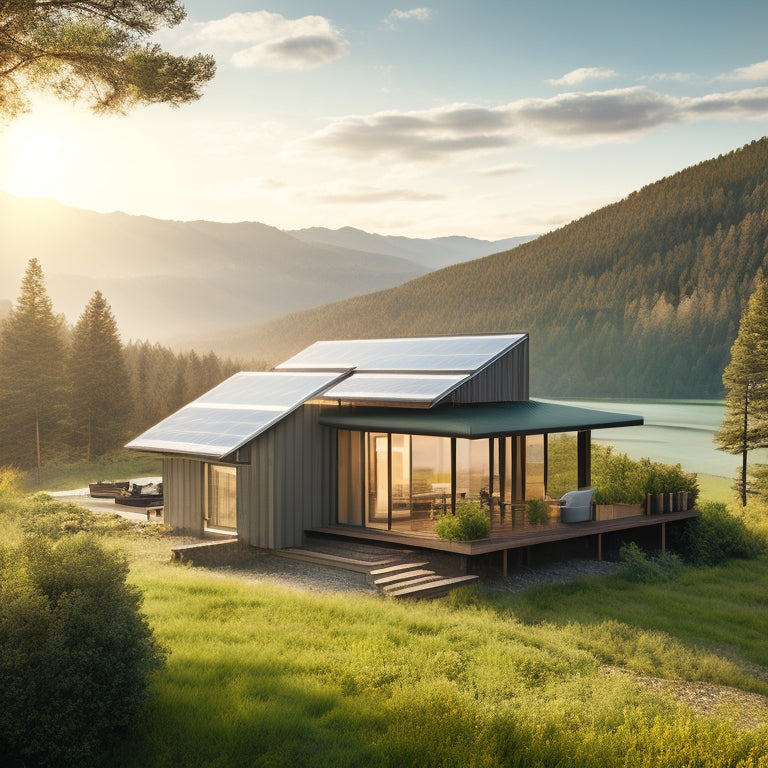
Ultimate Off-Grid Solar System Blueprint: Expert-Approved Designs
Share
You're about to design an off-grid solar system that meets your unique energy needs. Start by evaluating your daily energy consumption, ranking appliances by priority, and calculating your total energy requirements. Choose high-efficiency solar panels, a reliable battery bank, and essential system components. Guarantee efficient energy storage by considering depth of discharge, round-trip efficiency, and cycle life. Monitor and maintain your system's performance through tracking and diagnostics. By following expert-approved designs and best practices, you'll optimize your system for maximum efficiency and reliability. Now, get ready to uncover the complexities of each component and how they work together to power your off-grid lifestyle.
Key Takeaways
- Assess energy needs and prioritize loads to allocate energy effectively, ensuring a reliable and efficient off-grid solar system.
- Select high-efficiency solar panels and batteries, considering factors like durability, cost, and temperature coefficient for optimal performance.
- Design a battery bank with proper thermal management, safety precautions, and maintenance practices to ensure a steady power supply.
- Implement performance monitoring and maintenance schedules to track energy output, detect faults, and update software for optimal system operation.
- Follow expert-approved designs and installation best practices, considering factors like storage capacity, load management, and future expansion for a resilient off-grid system.
Understanding Off-Grid Solar Basics
As you investigate the world of off-grid solar systems, it's essential to grasp the fundamental principles that govern their operation.
You must understand that off-grid solar systems rely on solar energy fundamentals, such as photovoltaic cells converting sunlight into electrical energy. This energy is then stored in batteries to guarantee a stable power supply.
To achieve off-grid efficiency, you'll need to optimize system components, including solar panels, charge controllers, and inverters. By doing so, you'll minimize energy losses and maximize your system's overall performance.
A well-designed off-grid solar system requires careful consideration of these solar energy fundamentals to secure reliable, efficient, and sustainable power generation.
Assessing Energy Needs and Goals
You'll need to calculate your daily energy consumption to determine the size of your off-grid solar system.
This involves ranking your appliances by power priority, so you can allocate energy to the most essential loads first.
Daily Energy Consumption
Determining your daily energy consumption is an essential step in designing an off-grid solar system that meets your needs.
You'll want to assess your energy efficiency and consumption habits to identify peak usage periods. Adopting sustainable practices, such as upgrading to energy-efficient appliances with high ratings, can considerably reduce your overall energy demand.
Conducting an energy audit will help you understand your usage patterns and identify areas for improvement. By making lifestyle adjustments, you can optimize your energy consumption and minimize your environmental impact.
This information will serve as a foundation for designing a solar system that utilizes renewable sources to meet your specific energy needs.
Power Priority Ranking
Three key areas of your off-grid lifestyle require careful evaluation: vital appliances, convenience items, and luxury devices.
You must prioritize your energy needs to guarantee your system meets your daily requirements. Vital appliances like refrigeration, lighting, and water pumping take precedence, as they're essential for your well-being.
Convenience items, such as laptops and TVs, come next, followed by luxury devices like pool pumps and electric heaters. This power priority ranking enables you to allocate energy resources efficiently, guaranteeing your system optimization.
Load Calculation Essentials
Accurate load calculation is essential to designing an off-grid solar system that meets your specific energy needs and goals. You need to identify the load types that will be connected to your system, including AC and DC loads, resistive loads, and inductive loads.
To do this, you'll need to assess your energy needs during peak hours, when your energy consumption is highest.
- Identify essential loads that must be powered during an outage or at night, such as refrigeration and lighting.
- Determine your total energy requirements in watt-hours (Wh) per day.
- Calculate your peak power demand in watts (W) during the peak sun hours.
- Consider any future load additions or upgrades to your system.
Choosing the Right Solar Panels
When selecting solar panels for your off-grid system, you're looking for a balance of efficiency, durability, and cost-effectiveness. You want panels that will maximize energy production while withstanding harsh weather conditions and lasting for years to come.
Look for high-efficiency panels with a minimum rating of 18%. This will guarantee you're generating the most power possible from your available roof or installation space. Be sure to follow installation guidelines to guarantee peak performance and longevity.
Consider factors like temperature coefficient, which affects panel efficiency in hot climates. Additionally, check the manufacturer's warranty and durability testing to confirm your panels will withstand the elements.
Designing a Reliable Battery Bank
Now that you've selected the right solar panels for your off-grid system, it's time to focus on storing the energy they generate. A reliable battery bank is essential to guarantee a steady power supply when the sun isn't shining.
When designing your battery bank, consider the following key factors:
-
Battery Chemistry: Choose a chemistry that suits your needs, such as lead-acid, lithium-ion, or nickel-cadmium, each with its energy density, charging cycles, and discharge rates.
-
Thermal Management: Guarantee proper ventilation and cooling to prevent overheating, which can reduce battery lifespan.
-
Maintenance Practices: Regularly check electrolyte levels, clean terminals, and monitor charging/discharging patterns to extend battery life.
- Safety Precautions: Implement protective measures, such as fuses, circuit breakers, and grounding, to prevent electrical shocks and fires.
Selecting Essential System Components
You'll need to choose the right solar panels for your off-grid system, considering factors like efficiency, durability, and compatibility with your battery bank.
Proper battery bank configuration is also essential, as it will impact the overall system's performance, reliability, and lifespan.
Solar Panel Selection
As your off-grid solar system takes shape, selecting the right solar panels becomes a critical step in achieving ideal energy production.
You'll need to evaluate factors like efficiency, durability, and cost. One key decision is choosing between monocrystalline and polycrystalline panels. Monocrystalline panels offer higher efficiency rates (up to 22%) but are more expensive, while polycrystalline panels provide lower efficiency rates (up to 18%) at a lower cost.
When evaluating solar panels, assess the following key factors:
-
Efficiency: Look for panels with high efficiency rates to maximize energy production.
-
Wattage: Choose panels with suitable wattage for your system's needs.
-
Durability: Select panels with a proven track record of withstanding harsh weather conditions.
- Certifications: Verify panels meet industry standards and certifications (e.g., UL, IEC).
Battery Bank Configuration
Your off-grid solar system's battery bank configuration is an important component, responsible for storing excess energy generated by your solar panels during the day for use at night or during periods of low sunlight.
Selecting the right battery chemistry, calculating the capacity, and determining discharge rates are necessary considerations. Proper installation, maintenance practices, and inverter compatibility are significant for system efficiency.
When expanding your system, guarantee load balancing and performance optimization. Safety precautions, such as ventilation and protection from overheating, are essential.
Calculate your capacity needs by considering your daily energy usage and the number of days you want your system to operate without sunlight.
Follow expert-approved designs to guarantee a reliable and efficient battery bank configuration that meets your off-grid energy needs.
Ensuring Efficient Energy Storage
Efficient energy storage lies at the heart of a reliable off-grid solar system, and selecting the right battery bank is critical to guaranteeing a steady supply of power.
You need to take into account energy efficiency and storage solutions that meet your specific needs. When choosing a battery bank, consider the following key factors:
-
Depth of discharge (DOD): Verify your batteries can handle the daily charge and discharge cycles.
-
Round-trip efficiency: Opt for batteries with high efficiency to minimize energy losses.
-
Cycle life: Select batteries that can withstand the number of charge cycles you expect.
- Temperature range: Choose batteries that can operate within your system's temperature range.
Monitoring and Maintaining Performance
Through careful planning and installation, your off-grid solar system is now generating power and storing energy for later use.
However, it's essential to monitor and maintain its performance to guarantee peak energy production and storage. You'll need a performance tracking system to monitor key metrics such as energy output, battery state of charge, and system voltage.
This data will help you identify potential issues before they become major problems. Regular system diagnostics will also help you detect faults, such as faulty inverters or malfunctioning charge controllers.
Frequently Asked Questions
Can I Connect My Off-Grid System to the Grid in the Future?
Can you future-proof your off-grid system? Absolutely! You're not locking yourself into isolation; with a hybrid inverter, you can seamlessly connect to the grid in the future, allowing for easy future expansion and grid connection when needed.
How Do I Protect My System From Lightning Strikes and Surges?
You'll protect your system from lightning strikes and surges by installing lightning rods on your roof, connecting them to a grounding system, and using high-quality surge protectors on your electrical panels and charge controllers to absorb voltage spikes.
Are There Any Specific Installation Requirements for Coastal Areas?
Ancient mariners knew the sea's fury; you'll need to prep your solar system for coastal considerations too. You'll want to make certain your equipment is resistant to saltwater corrosion, using materials like anodized aluminum or stainless steel, and follow strict installation guidelines to withstand harsh coastal conditions.
Can I Use an Off-Grid System to Power an Electric Vehicle?
You'll need to guarantee your off-grid system can handle electric vehicle charging demands; choose solar panels with high power output and a compatible inverter to support Level 2 charging, and consider a battery with sufficient capacity to store excess energy.
How Often Should I Replace the Water in My Flooded Batteries?
As you tend to your off-grid haven, remember to check your flooded batteries' water levels regularly, like a gardener nurturing a delicate bloom, and replace the water every 3-6 months to guarantee peak battery maintenance and performance.
Related Posts
-

Sustainable Scrubbing: Top Bathroom Solutions for Earth-Conscious Homes
You're taking an important step towards creating a more sustainable home by switching to eco-friendly bathroom cleani...
-

5 Ways Geothermal Power Boosts Electric Vehicle Efficiency
You're likely unaware that geothermal power can greatly enhance your electric vehicle's (EV's) performance, range, an...
-

What Water-Saving Gardens Complement Electric Vehicle Ownership?
As you pair your electric vehicle with a water-saving garden, you're not only reducing your carbon footprint but also...


